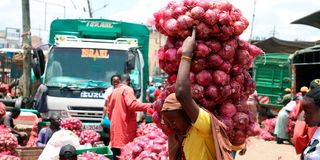Breaking News: At least 10 feared to have drowned in Makueni river
Production work plan of onion crop

Onion sellers at Muthurwa market in Nairobi on October 10, 2022. The farm manager or operator is responsible for planning activities during onion production.
The onion crop has bulbed and is almost ready for harvest. Farmer Desmond waters in the evening to reduce the rate of evaporation.
In this article, we look at the work plan employed by Desmond to ensure production is successful. A work plan is a written guide that helps streamline farm operations.
Production objectives of a specific crop cycle are meant to be represented visually in the work programme.
When creating a work plan, one should preferably take into account all of the activities of the farm and the labour needed to complete the activities.
To make an effective work plan, it is important to list everything going on.
The ideas of the farm operators and managers should be taken into account when making the plan. Additionally, it guarantees the owner of the operations on the farm.
To begin with, weeding is crucial as it reduces competition for nutrients and space between crops and weeds.
Weeds also harbour pests and diseases or act as their alternative hosts.
The foundation of a weeding work strategy should be based on scouting records.
Weeding should also be done as soon as these unwanted plants appear in an effort to reduce the cost of onion production. One of the most common activities on a farm is scouting.
Scouting ensures preventative measures for pests and diseases.
It is also during the scouting that crop water requirements are observed. Scouting therefore needs to be regular.
Depending on the level of production, scouting can be daily or three to four times a week.
If a farmer wants to get the most out of the crops, he or she should think of protecting them from pests and diseases.
Based on the results of the scouting, the farmer should also make plans to use the right pest control products.
It is crucial to have an expert perform the scouting. This guarantees consistency in the interventions and the results.
Since this serves as teaching opportunity for farm owners, it is also important to involve them in the scouting.
That is why the work programme should be created in accordance with the production activities in the farm.
The work plan should be developed for the whole crop production cycle. However, reviews should be done every week to ensure they are on track.
This makes it easy to plan ahead for the necessary labour, inputs, and other resources required by the farmer.
The farm manager or operator is therefore responsible for the planning of the activities.
He or she should plan and consider the labour required.
Planting, weeding and harvesting, for instance, require more labour, which can sometimes be outsourced. We shall look at the marketing of the onion crop in our next article.





